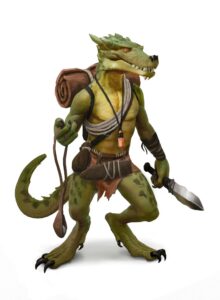For the first time, I left the evening of D&D feeling accomplished. This time, things seemed to click. The DM drew us further into our character development, and I felt more connected to the character I had essentially created as a joke, as well as a game that was still extremely foreign to me. My character now breathed. There was a specificity to the spells that he cast that resonated with me in a way they wouldn’t have if the DM would’ve continued to explain every attack and action for us. He had stopped holding our hands and telling our stories, to allow us to start cultivating our own facets to the overarching narrative. I cast fire bolt from my right arm, and it wells up from my chest, down through my veins, boiling hot, welling up on my pointer finger until it propels toward its target.
 Simple, I know. Rudimentary, even. Yet, allowing me to describe my attacks has enriched what was, up to this point, a difficult play style to get into. After the DM handed the reins over to the players to think quicker and to be more decisive, the game comes across much more alive. It’s as if we’re racing a clock that doesn’t keep time, but does push the passing of time and the narrative forward. Once we took too long deliberating over our next move and, all of the sudden, incredibly jerky kobolds start chucking rocks at our heads. As *plonk* annoying *bump* as *boof* being pelted by rocks is, it is equally refreshing to feel the narrative being pushed, to have that sense of urgency and purpose. Time didn’t stand still, there is no pause button, and I deeply appreciated that!
Simple, I know. Rudimentary, even. Yet, allowing me to describe my attacks has enriched what was, up to this point, a difficult play style to get into. After the DM handed the reins over to the players to think quicker and to be more decisive, the game comes across much more alive. It’s as if we’re racing a clock that doesn’t keep time, but does push the passing of time and the narrative forward. Once we took too long deliberating over our next move and, all of the sudden, incredibly jerky kobolds start chucking rocks at our heads. As *plonk* annoying *bump* as *boof* being pelted by rocks is, it is equally refreshing to feel the narrative being pushed, to have that sense of urgency and purpose. Time didn’t stand still, there is no pause button, and I deeply appreciated that!

This doesn’t mean IN ANY WAY that puns weren’t had a-plenty! After we cleared out some kobolds and cultists, we interrogated one who told us about a rear guard that followed raiders on their missions. Seeing as how archers generally keep distance, I thought it only proper to mention that “after every raid comes the raid-bow.” My character is a wizard, and wisdom is my first line of offense! From now on, I may have to bring a spatula to assist in palm removal from foreheads. I’ll throw one in my car for next time.
My character, S. Pell Slanga, had motivations now, some growth, and some goals. My original iteration was a skateboarding wizard that attacked with 360 flips to the face and sundry skateboarding tricks. I wasn’t sure how plausible it was, and this deep into the campaign I wasn’t sure that it was worth bringing up. All of the sudden, the DM asks me, “Weren’t you looking for a skateboard?” and, I confess, my smile was ear to ear. Through a series of trials and working our way through the DM’s added lore, we took a side quest. Working our way through a maze, finding a dryad, answering riddles (which I am miserable at), and collecting wood and bark from a special tree, I finally got it: this was all constructed for me. It reminded me of a podcast that I listened to called Saving the Game. The episode “Unwritten Rules” (guest hosted by our esteemed Bryan) talked about the importance of making a player the star from time to time to let them feel unique in the world that they are interacting within. I thought it was a great idea, and after that side questing I can attest to its importance. I came back redoubled with excitement for our campaign as I now had a piece of my personal quest resolved.
I had a plank of wood, good company, and a squirrel-friend (this is the creature I have when I cast Find Familiar. The DM allowed the creature to be a squirrel, which I wanted as it allowed for the pun). Yes, a Squirrel-friend. Her name is Donna, Donna Veil. She is a great help to me, allows for greater exploration, for eyes above scuffles (when tall things are around), hilarious ways to finish off powerful monsters that have 1 or 2 HP left, and she’s just the cutest thing!
Onward we moved, to our next location: Baldur’s Gate.
